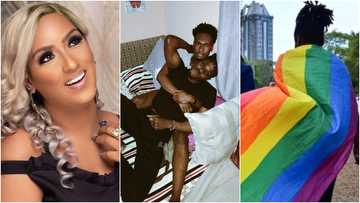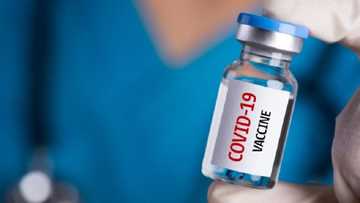How LGBT friendly is Ghana?
Ghana, like many other countries in Africa, has not yet entirely accepted the LGBT community into our society. While many groups are defending them, they still face discrimination and even violence from the people who are against them. For instance, here in Ghana, the LGBTQ persons continue to experience discrimination and violence, which is against human rights. Even so, the Commission on Human Rights and Administrative Justice (CHRAJ) and the police have been in the frontline to protect them.

Source: Instagram
The struggle between the LGBTQ persons and Ghanaian citizens has forced Sisters of the Heart and Alliance for Dynamics to intervene to negotiate for an effective plan. They plan to engage the government to create rules that facilitate the LGBTQ just like any other citizen. It is unfortunate that currently, most employers deny these persons job opportunities. In fact, in most instances, they distance themselves from these persons. In addition, if the victims are students, they risk suspension.
The state, through different bodies supporting LGBTQ persons has allocated resources to educate people and the media on how to treat these marginalized groups. However, what is more worrying is the increasing cases of state officials, religious leaders and other influential leaders who make homophobic statements about the groups. In most instances, citizens show appreciation of what their leaders tell them.
Therefore, this has significantly in worsening the situation. Like you, I suppose, many people consider LGBTI groups to be criminals. Before legalizing marriages of the same gender in Ghana, individuals found engaging in this type of marriage were punished by imprisonment not exceeding three years.
READ ALSO: LGBT rights group Sisters of the Heart pleads with Ghanaians to care about gay rights
Ignorance of protection from the public
Ghana, unlike most western countries, considers gayism and lesbianism forbidden. “Forbidden” is a strong term to use here, but that is precisely what the larger percentage of its people feel like. This to many of us explains the reason behind the U-turn on the policy that sought to help the government curb homophobia.
Many of the LGBTIs are afraid to support their rights because of the threat of violence. Precisely, many of them do not count on police protection. For that matter, reporting homophobic violence to the police is usually a waste of time. Besides, anti-gay laws forbid LGBT persons in Ghana to report such instances until the law is passed officially.
Punishing offenders
Ghana is among the many countries in the world that respects the rule of law. Individuals going against the laws of the land are taken to court and prosecuted if found guilty. In an effort to protect the LGBTQ community, the police have always arrested those physically harassing them. A good example is a case that occurred last month, where the police arrested a group of individuals purported to have harshly treated gay men by beating them and robbing their belongings. However, groups allied to the LGBTQ community have expressed their dissatisfaction on how such cases are handled.

Source: Instagram
To them, arrested individuals are not punished accordingly. No stiff penalties are applied to offenders. This shows how little concerned the authorities tend to be when it comes to matters touching the LGBT people. Also, the groups have, on many occasions, come out to challenge the government on the issue of criminalizing lesbianism. Marriage between women is not taken heftily as it is with men. Given the current circumstances, the individuals are feeling rejected and useless in the society that they claim should be their home; a home that is condemning them instead of accepting their conditions.

Read also
LGBTQ-themed movie by Juliet Ibrahim et al to premier in solidarity with Ghana's gay community
They have, on many occasions, conducted peaceful demonstrations expressing how they feel. However, not so many people approve of their practice. The church, in particular, does not cite with them at all. Christians and Muslims have the most significant percentage of people disapproving them. It is interesting to note that it is only a fair percentage of atheists who feels like they should be heard and treated just like any other Ghanaian.
LGBT travel Ghana
As a country that respects its dignity, Ghana does not allow people of the same sex to share a room, especially during traveling. Yes. Even though the state recognizes the same gender marriage, still, this one is forbidden. It becomes even worse when it involves men. However, punishment is not that serious in Ghana as compared to Somalia, Sudan, Nigeria, and Mauritania. In these countries, gay couples are punished by death.
Enhancing friendliness
Every person has equal rights in Ghana. While the larger population of its citizens do not agree with the LGBT society, there is a need to strategize effective means of handling its people. Human rights organizations and other LGBTQ related bodies should move in fast to their rescue. Otherwise, most of them will be killed or commit suicide because of stigmatization and open rejection. We live in the 21st century. Each citizen should be allowed the freedom to associate with the people they feel most comfortable with. Just like there is freedom of worship, concerned bodies are fighting to make sure the same happens with the LGBT community in Ghana.

Read also
Int'l Women’s Day: Barriers to females entering Engineering must be removed – Ing. Carlien Bou-Chedid
One of the significant steps that the government ought to take is to educate people on how to treat these marginalized groups. Instead of denying LGBT persons their freedom of association, job opportunities, and others, understand why they chose their paths. To some, it is not a choice —like a case of transgender individuals. Secondly, the government should regulate how media reports cases involving marginalized groups. Better still, they can be taught on how to report on such matters instead of restricting them. This way, people will learn to accept them in our society. Lastly, leaders have a significant voice in society.
Is Ghana safe? Well, instead of condemning LGBT, they can help followers to understand why they chose to engage in such practices. Above all, no one should decide on another. We have to believe in what we think is best for us.
READ ALSO: National cathedral’s secretariat denies taking $25 million from the ‘gay community’
Source: YEN.com.gh



